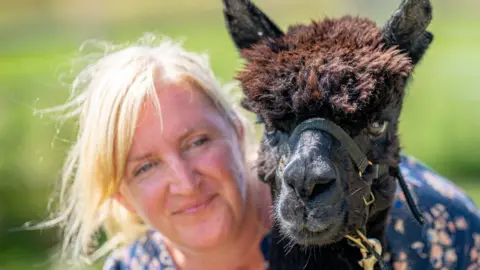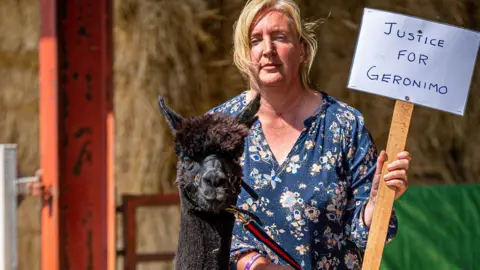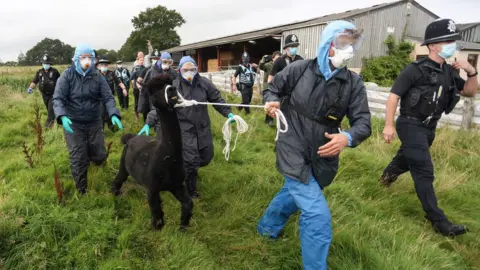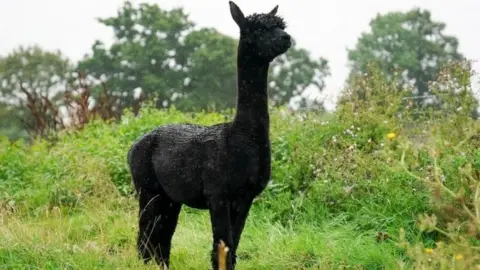Geronimo the alpaca's owner calls for bTB policy changes
 PA Media
PA MediaThe owner of an alpaca that was destroyed as it was suspected of having bovine tuberculosis (bTB) has called for a "complete reform of TB policy".
Geronimo was taken from his farm, near Bristol, and put down in August, after he twice tested positive for the disease using disputed methods.
Owner Helen Macdonald said his death had shown the public "what is going on" with attempts to control bTB.
The government said the probability of false positives was "extremely low".
 PA Media
PA MediaMs Macdonald said she wanted a "complete reform of TB policy" after challenging the accuracy of tests - something that government vets dispute.
The policy also includes schemes such as culling badgers.
"We have to accept at some point that the diagnostic tests aren't good enough... we have to have change," Ms Macdonald told BBC Radio Bristol.
A spokesperson for the Department for Environment, Food and Rural Affairs (Defra) said the tests were "developed and validated specifically for camelid animals which includes alpaca".
"It has a very high specificity, which means that the probability of false positive results is extremely low - at just 0.34% in the case of Geronimo's first test," they added.
 SWNS
SWNSMs Macdonald consistently argued the Enferplex test was fundamentally flawed.
Post-mortem tests for bTB on Geronimo were inconclusive.
She said the reason he had tested positive was because as part of the test he was primed with tuberculin - a purified protein derivative of bovine TB bacteria.
Government vets said the inconclusive test results did "not mean the animal was free of bTB".
They said they had followed the advice to cull animals to prevent its spread.
Defra said an initial post-mortem held in September showed "TB-like lesions", but Geronimo's supporters disputed the results.
Vets working with Ms Macdonald said there were no visible lesions of bTB.
Defra said the additional bacteria culturing process, which has been taking place since September, was not used to validate previous test results, but was instead used to identify which strain of the disease was present.
It said that helped inform decisions about testing other animals in the herd.
 Jacob King/ PA Wire
Jacob King/ PA WireThe government's chief veterinary officer, Dr Christine Middlemiss, said: "This animal tested positive for bovine tuberculosis on two separate occasions using highly specific tests.
"Due to the complexity of the disease, further testing has not enabled us to use Whole Genome Sequencing to try to understand how the animal became infected in the first place.
"Our sympathies remain with all those with animals affected by this terrible disease which devastates farmers' livelihoods."

Geronimo timeline
 PA Media
PA Media- Geronimo was brought to England from New Zealand in August 2017 by his owner Helen Macdonald
- The alpaca twice tested positive for bovine tuberculosis in August and November that year
- He was put into isolation away from the rest of the herd at the farm in Wickwar
- The government applied for a court order in July 2018 to have him destroyed
- Geronimo was given a stay of execution, with a deadline of the end of August for his slaughter
- Ms Macdonald then sought a judicial review claiming new evidence showed the animal was healthy, marking the start of a series of lengthy legal battles
- In November, Ms Macdonald won the right to a review at the High Court in London
- A hearing began in March 2019 and Ms Macdonald claimed government experts had relied on "flawed science"
- The case was dismissed in July 2019
- Ms Macdonald started an appeal and an order was made preventing Geronimo's death pending the appeal application
- She then took out an emergency injunction to delay a warrant to cull the animal before an appeal hearing on 29 July 2021
- The case was once again dismissed. A judge agreed to delay the start of a second execution warrant until 5 August, which was later extended to 4 September
- Geronimo was euthanised on 31 August
- An initial post-mortem examination in September found possible evidence of bTB, but supporters disputed the results

Follow BBC West on Facebook, Twitter and Instagram. Send your story ideas to: [email protected]
